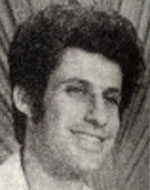Avner was born on March 23, 1945, to his parents Yona and Zvi, on Kibbutz Kfar Menachem. He spent his childhood with the kibbutz children’s group, but in 1948, with the outbreak of the War of Independence, the group was evacuated to Hadar-Ramatim in the Sharon, and only during the first break did they come to the kibbutz for a visit. According to his friends on the kibbutz, he had a very special personality in the kindergarten. He had many skills, not “one of the ranks,” but also a position among his friends. He graduated from the kibbutz educational institution. In the first grades he was active mainly in the fields of society and sports. He liked playing basketball and swimming a lot. Later, in the upper grades of the school he was very interested in history, geography and knowledge of the country. Mostly thanks to his writing skills and quick reading he learned everything easily and achieved excellent achievements. He did not abandon areas of interest: he painted and for a while even invested in learning the Arabic language. During the last years of his studies, he became increasingly inclined to study in real subjects and in subjects such as mathematics and economics, where he later worked as part of his profession and work. “Avner was hungry to know, he wanted to understand everything and nothing to abandon.” When he was a student at the educational institution, he was not really interested in him. , But in fact it was a tremendous inner drive to know and understand, an impulse that could not and would not allow him to give up. ” When he was fourteen, Avner’s parents left their kibbutz. Avner also had a question about his future, and when he decided to stay in the kibbutz, he found his home in the house of his parents’ friends. Toward the end of his studies, he decided to continue his studies at the university. In his enlistment in the IDF in 1963, he completed his army service in the army, and in the early days of the Six-Day War he transferred to the Armored Corps During the war, he took part in battles in the Kantara region in northern Sinai and after the war was appointed deputy commander in the battalion, where he served in the Yom Kippur War. According to his subordinates and friends, Avner, as a commander and a citizen, had a very practical, thorough and uncompromising approach to the implementation of orders and tasks imposed on him or that he took upon himself: “His serious image radiated trust and high morality, and this seemed to enforce his authority. And often collided with the hard-line military frameworks. “It was characteristic of him that the transfer of instructions to his subordinates was done only after careful thought, sometimes slowly but always with criticism and thoroughness. Close to their hearts while he listened attentively to their words, the decision to leave the kibbutz and her After completing his studies at the Hebrew University of Jerusalem, Avner began studying economics and statistics at the Hebrew University of Jerusalem, where he had to invest a great deal in his studies. In the same year, he began working as an assistant in the Bank of Israel’s Research Department, and was also an assistant at the University’s Statistics Department, where he had strong self-discipline and a modest way of life and invested all his efforts in self-study. He had an uncommon ability to absorb what was being learned, out of a desire to attain a high level of knowledge, as he required of himself in most of the fields he dealt with. His great intellectual curiosity led him to exhaust himselfHe inspired them to learn with maximum pleasure and satisfaction. He graduated from the BA. With excellent achievements and completed his graduate studies near the outbreak of the Yom Kippur War with honors. After completing his bachelor’s degree, Avner became more and more available to his work at the Bank of Israel. At first, he worked on preparing monthly data on the development of the money supply by the public, and then concentrated on the economic analysis, combining excellent theoretical knowledge and analytical ability. When he was required to update his statistics weekly and daily, he concluded that the system needed to be automated, and with the help of an expert in computer work, he began planning and programming. The generosity of Avner’s personality and his great openness made the connection between him and his friends stronger. He also returned to his favorite sport, and in his quest for self-action, he did not abandon household tasks such as woodwork, electrical and mechanical repairs and other “patents”, which testified to great diligence. As he was known as a clear peace seeker, was able to devote a considerable part of his time to reserve service, when the sense of obligation to the IDF and the State guided him with great dedication as an officer and commander. He set out with his unit to break through the besieged fortress of Budapest, in the northern Suez Canal. In an attempt to rescue a unit of soldiers who encountered an ambush of the Egyptians, Avner was hit on October 15, 1973, and was killed. He was brought to eternal rest in the Beit Yitzhak cemetery. He left behind a wife, parents, a brother and a sister. After his fall, he was promoted to captain. His family published a book in memory of family members, commanders, teachers and friends, as well as sections of scientific work he wrote during his studies; The Hebrew University published its scientific work: “The Impact of Money on a Dual-Sectoral Growth Model in an Open Economy” Prof. Dan Pettenkin devoted his book, published in English, “The Theory of Keynes” to Avner son of-Eliezer and Yoav Brom.
